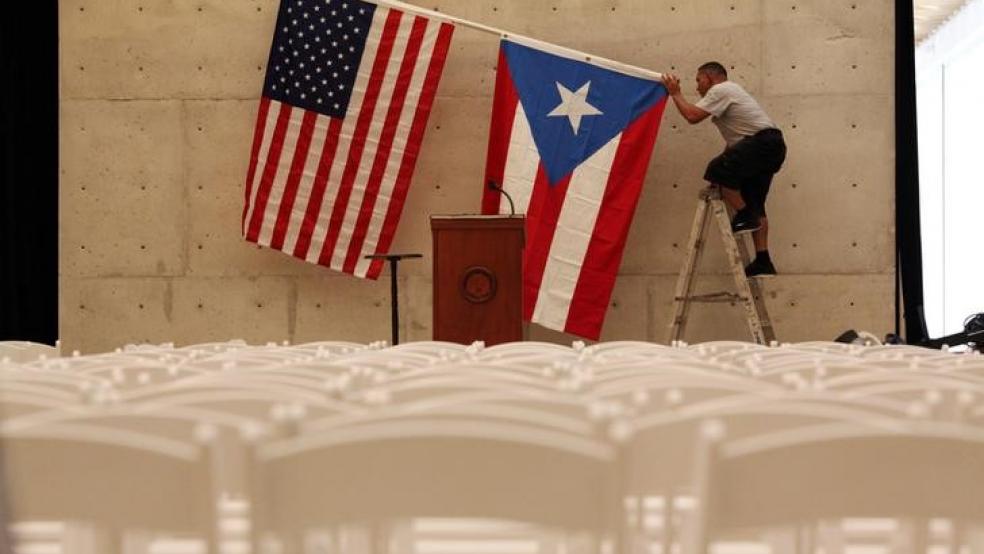Thousands of Puerto Ricans who fled the economic crisis on their island and flocked to Florida in search of jobs could tilt the state to Hillary Clinton and effectively block Donald Trump’s path to the presidency.
Susan MacManus, a distinguished professor of political science at the University of South Florida and an expert on the state’s politics, said in an email yesterday: “The influx might help Hillary win the state because Democratic registration groups like Mi Familia Vota have aggressively worked to get the new arrivals to register as Democrats.”
Related: Election 2016: Will It All Be About Florida Again?
Trump has a 1-point lead in Florida today in a four-way race, according to the Real Clear Politics average, but that is a margin-of-error edge in a state that he must win if he has any path to victory. If Clinton can block Trump in Florida, he will – barring some act of the gods -- be finished.
The Washington Post today posits four ways Trump could win. In each scenario, he must take Florida.
As part of an online fund-raising message yesterday, Kellyanne Conway, Trump’s spokesperson and campaign manager, released a map showing Florida too close to call. But she said if Trump won there and in Iowa, Ohio, Maine, Nevada and North Carolina, he would have 266 Electoral College votes and would need a win in only one of battleground states of Colorado, New Hampshire or Pennsylvania to get over the 270-vote top. That’s true. But if he lost Florida, he would need to be victorious in all three of those states to claim the presidency.
Related: If This Poll Is Right, Trump Can’t Win Florida -- or the Election
One major Clinton backer who recognizes the critical role Puerto Ricans in Florida may play is billionaire investor George Soros. According to Univision, he has bankrolled a PAC, United for Progress, that was set up just last month to mobilize Puerto Rican voters in Florida. Marco Vilar, a veteran of Hispanic voter registration organizations, including Mi Familia Vota, is running the effort. Attempts to contact Vilar were unsuccessful.
The number of Puerto Ricans living in Florida has increased 110 percent since 2000, according to a 2015 Pew Center for Research report, with a big spike in the past few years. There are now more than 1 million Puerto Ricans living in Florida, Pew says, and they are poised to pass Cuban-Americans as the largest Hispanic group in the state.
There is some disagreement about the percentage identified as Hispanic out of Florida’s almost 12.7 million voters. Most reports say 15 percent, but Mi Familia Vota, which has received money from Soros’ Open Society Foundations in the past, says there are 2,557,000 Latino voters in the state, or about 24 percent.
Related: Is Trump Pulling Ahead? Here’s What the Polls Are Really Saying
Most of the new Puerto Rican arrivals in Florida have registered as Democrats, Univision says, and overall, more new voters have registered as Dems than Republicans in the two most recent months recorded, according data on Florida’s Division of Elections website. In September, 41,873 new voters registered as Republicans, while 67,546 registered as Democrats.
Of course, those new voters aren’t all Latino, and there is no guarantee they will show up at polling places on Nov. 8.
MacManus says that among the newly arrived Puerto Ricans “there is an impetus to register as Democrats, but the reason they are more likely to vote for Hillary is less party than an anti-Trump sentiment traceable to his negative comments about immigrants.”
At a street festival in Orlando on Oct. 25, Republican Senator Marco Rubio, who has distanced himself from Trump but not disavowed him, was booed off the stage by a largely Puerto Rican crowd.
And Latino Decisions, a polling firm employed by the Clinton campaign, found some 70 percent of Puerto Ricans in Florida supporting Hillary, with an even larger percentage among those born on the island, according to Bloomberg Politics. As American citizens, the new arrivals are immediately eligible to vote. But will they?
Puerto Rico, Bloomberg pointed out, has one of the world’s highest voter-turnout rates.





